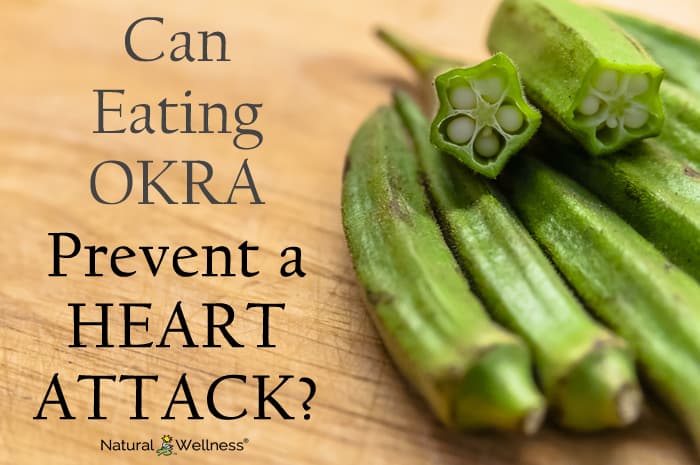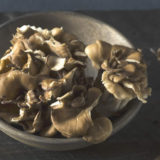

Updated February 8, 2023
Okra is a vegetable of Ethiopian origin and goes by many names. Hibiscus Esculentus, lady fingers, okro, gumbo, and kiabo among others (1).
It’s delicious when prepared properly and chock full of vitamins A, B, C and K, potassium, magnesium, and many flavonoids such as beta-carotene.
From long-term heart health, cholesterol management, blood-pressure and even skin and hair health – the benefits of eating okra are huge!
Okra’s Nutritional Profile
According to the U.S. Department of Agriculture (USDA) National Nutrient Database, one cup of raw okra, weighing around 100 grams contains:
- 33 calories
- 1.93 g of protein
- 0.19 g of total fat
- 7.45 g of carbohydrates
- 3.2 g of fiber
- 1.48 g of sugar
- 31.3 milligrams (mg) of vitamin K
- 299 mg of potassium
- 7 mg of sodium
- 23 mg of vitamin C
- 0.2 mg of thiamin
- 57 mg of magnesium
- 82 mg of calcium
- 0.215 mg of vitamin B6
- 60 micrograms (mcg) of folate
- 36 mcg of vitamin A
Okra’s Heart Health Benefits…and So Much More!

Now that we have a sense of how nutrient-rich okra is, let’s delve deeper into what its health benefits are.
Okra’s uncooked texture is similar to the aloe vera plant, and so it should come as no surprise that much of okra’s health benefits stem from that clear goo known as mucilage (3). The mucilage in okra is found in the pods and is comprised of sugar residues called exopolysaccharides and proteins called glycoproteins (3).
- Exopolysaccharides are known to reduce cholesterol, blood-pressure and glucose in the body (4). Lowering blood-pressure long-term can help prevent a myriad of chronic illnesses – including a heart attack!
- Glycoproteins are an essential component to cell health. Their name means a protein with a sugar attached, and they play a heavy hand in our immune system, intercellular communication, and reproductivity (5).
- Flavonoids are a wide class of plant pigments known to possess many benefits including reduced risk of cancer, stroke, and heart disease (6).
Okra has high levels of all of the above.
The Alternative Health Universe echoes what we already know about exopolysaccharides in saying that okra can “reduce the total cholesterol and triglyceride levels and improve the production of bile acids in the stool, which will prevent atherosclerosis and heart attack in the long run.”
If preventing heart attacks long term isn’t a good enough reason to start eating okra, maybe delivering some of the most essential vitamins and minerals will entice you.
With such high vitamin C count, okra is a powerful antioxidant, helping your body repair tissues and fight free radicals.
By extension, eating more okra can rejuvenate our skin, hair, and shield you from degenerative diseases commonly associated with prolonged free radical damage.
In addition, okra pods also contain very high levels of polysaccharides, polyphenols and flavonoids (7).
But the benefits don’t stop there!
Because of how fibrous okra is, it will keep you fuller for longer, hopefully helping you curb any between meal cravings you may get (1).
The antioxidants and polyphenols in the pods also help with fatigue by promoting glycogen storage in your liver, which translates to more energy for your cells.
One more crucial vitamin on the list is vitamin K. And okra is a great source of it, meaning okra can be excellent for reinforcing your bones and aiding blood coagulation, providing 4 of the 13 proteins required for blood-clotting (1). Vitamin K also helps break down old blood cells, which helps lighten the load on your liver.
What Does Okra Feel and Taste Like?
Okra’s flavor profile is somewhat mild, not dissimilar from eggplant, but a bit more delicate. Its texture, however, is very different, being much more fibrous than eggplant and, when uncooked, it can feel slightly slimy. Although, when cooked properly, okra becomes a rich and silky addition to any dish.
7 Ideas on Eating and Using Cooked Okra
- Okra is relatively easy to prepare, taking about 10-12 minutes to sauté until tender.
- A simple recipe would be to sauté your diced okra with several garlic cloves, a diced onion, olive oil and season with salt and pepper.
- Or chop into medallions and toss into a stew.
- The basic idea behind cooking okra is getting it tender, either by sautéing, baking or boiling (9). Treat it like you would eggplant. Or any other fibrous vegetable.
- Whether you chop it, slice it, stew, sauté or fry it, okra pods can be preserved through pickling, and the leaves are also edible raw in salads.
- The mucilage can also be used as a thickening agent in cooking, and serves as a viable vegetarian egg/coagulant replacement.
- When okra is boiled, the transparent mucilage can be collected and even be used to moisturize your hair (9)!
Does Eating Okra Have Any Side Effects?
So we know how great okra is. It tastes yummy. It’s amazing for your body.
But what – if any – are the side effects of eating okra?
And how much okra is too much?
Okra can be difficult to digest for people who already have stomach or gastrointestinal issues such as irritable bowel syndrome. This is because okra is rich in fructans, a carbohydrate that can lead to diarrhea, flatulence, cramping, and bloating in those with bowel problems (9).
If you’re not one of those people, it’s difficult to tell how much okra is too much, but over-consumption may be difficult to achieve given okra’s high fiber content that will fill you up fast.
Conclusion
What’s for certain is that okra is safe to eat on a daily basis and comes with a host of health benefits, including long-term cardiovascular health, blood-pressure regulation, and could even help prevent a heart attack.
It’s easy to prepare, it’s tasty, and it’s even inexpensive. You will not regret adding it to your menu.
Editor’s Note
If you have heart issues or are concerned about your heart, cholesterol or triglyceride levels, we’d also recommend you take Super Omega-3 Fish Oil which contains high levels of EPA and DHA omega-3 fatty acids. As per the FDA, there is sufficient research to prove that consumption of EPA and DHA omega-3 fatty acids may reduce the risk of coronary heart disease. View full details.




